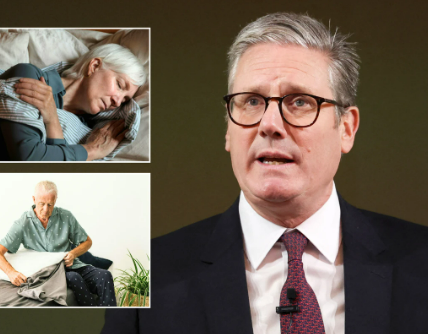Another 1,100 prisoners will be freed next week under Labour’s early release scheme – after offenders started committing crime within hours when last batch were allowed out_Nhy
Another 1,100 prisoners are due to be freed at the start of next week under Labour’s controversial early release scheme.
The offenders will be the second round of inmates to be let out in a bid to free up space in UK jails.
However, some of the 1,700 convicts released in September started committing crimes within hours of being freed with the first returned to jail after just 36 hours on the outside.
The inmate is understood to have failed to turn up to a pre-arranged address, leading to probation officers alerting police who brought him back to custody.
Another was charged with sexually assaulting a woman just an hour after being let out.
The 31-year-old repeat offender allegedly assaulted a female prison worker while he was being given a lift to a railway station.

An inmate leaving HMP Liverpool on September 10 under the scheme (file picture)

People spray a man with sparkling wine after he walked out of HMP Nottingham on September 10 (file photo)

This is the moment police immediately re-arrested a man at the prison gates after he was released
The man was among a small group of inmates given a lift from HMP Swaleside on the Isle of Sheppey, Kent, to Sittingbourne station 11 miles away as a ‘gesture of goodwill’.
He quickly left the vehicle and caught a train to London but was arrested the next day in Croydon.
The released prisoner was immediately recalled to prison as a result of the incident, a British Transport Police spokesman said.
In a separate case, one man was arrested on suspicion of rape and sexual assault just seconds after he walked out of Wandsworth Prison in south-west London.
The 28-year-old man was cuffed and led away in a waiting police van – raising questions of why he was ever lined up for early release in the first place.
Shockingly, 37 prisoners were also mistakenly released after a system error, authorities admitted.
Sources from the Ministry of Justice said 37 inmates, all jailed for breaching restraining orders, were freed by error.

Inmates seen leaving HMP Prison Brixton on September 10 (file photo)

Pictured: HMP Swaleside in Kent where a man arrested on suspicion of sexual assault was being held
Stalkers and domestic abusers were among those accidentally released.
The early release scheme has reduced the proportion of a sentence most offenders must serve behind bars from 50 per cent to 40 per cent.
The first round of releases, in mid-September, saw 1,700 inmates set free early and helped the prison population fall from a record of 88,521 to 86,333.
Numbers have since risen again, reaching 87,028 on Friday, just below the levels seen when Justice Secretary Shabana Mahmood announced the plans in July.
Ms Mahmood had warned then that prisons risked running out of space, potentially causing the collapse of the justice system as courts would have nowhere to send convicted criminals.
The early release scheme does not apply to some inmates, including those convicted of sexual, domestic abuse or terrorism offences, or violent offenders serving sentences of more than four years.
September saw 37 inmates released in error after their sentences had not been correctly logged. Ms Mahmood confirmed on Thursday that all 37 were back in custody.
Ms Mahmood is expected to launch a review of sentencing during the week, which is likely to consider several reforms including whether tougher community sentences would be more effective than short spells in prison.

Justice Secretary Shabana Mahmood’s (pictured) programme, known as SDS40, allows criminals to be freed after serving 40 per cent of their sentence rather than half, due to jail overcrowding
This follows her announcement that magistrates’ sentencing powers will be doubled again, allowing them to jail criminals for up to a year.
The move is intended to ease the backlog in the crown courts and reduce the number of remand prisoners waiting to receive sentences, but the Justice Secretary acknowledged this would initially ‘see a slight increase in the overall prison population’.
But the Criminal Bar Association warned that extending magistrates’ powers was a ‘short-term and long-term backfire’ as it could ‘sharply increase’ the overall prison population within a matter of months.




